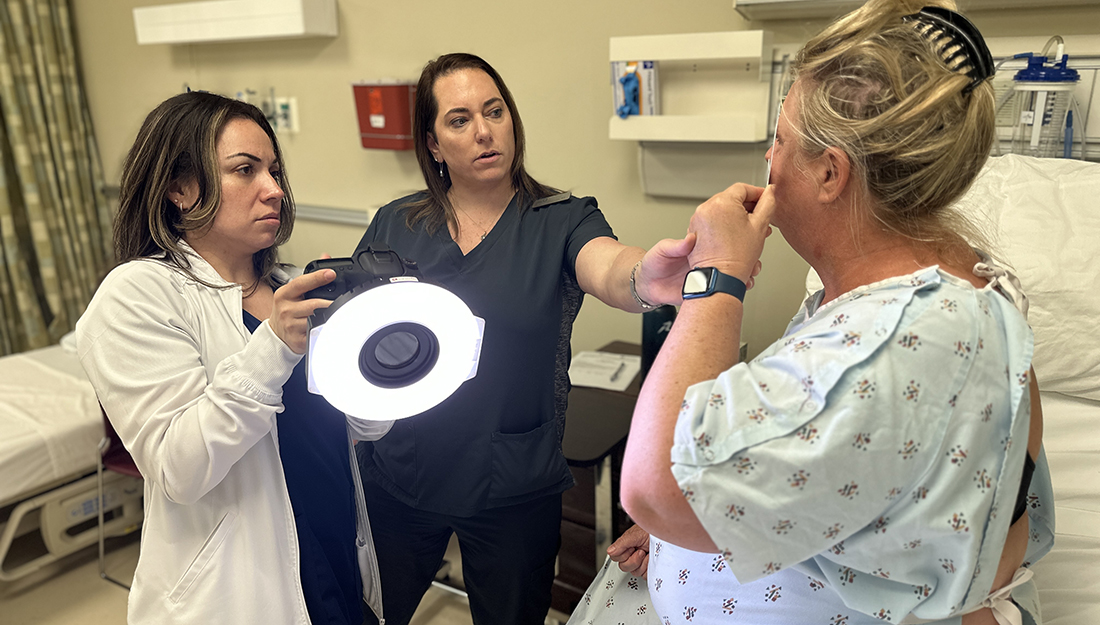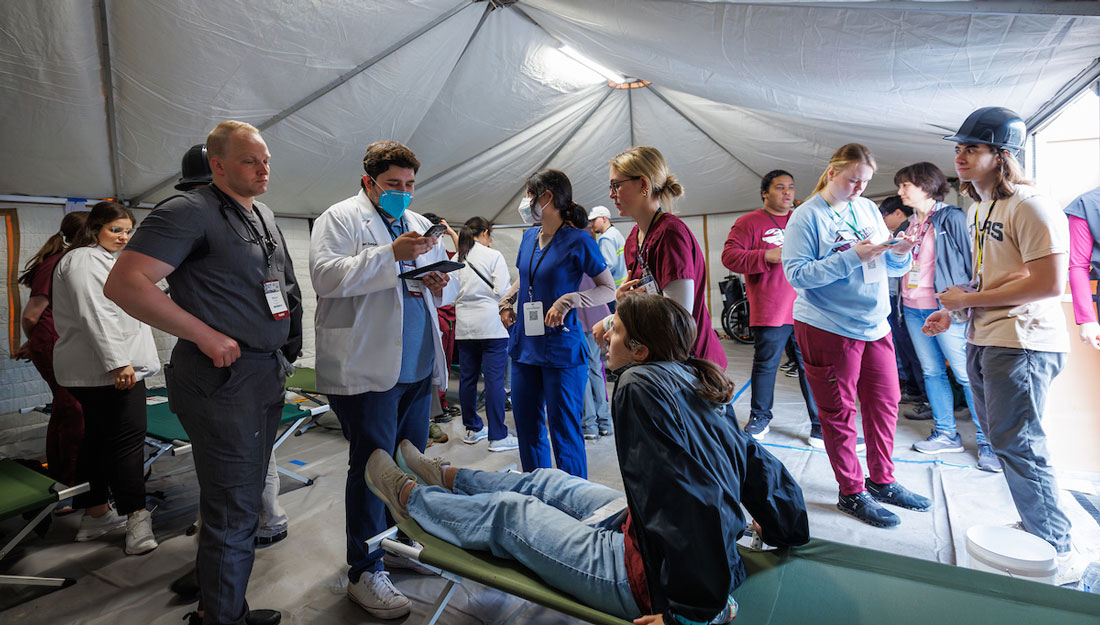- Tim Gerszewski
- Community, Community Impact, Nursing, Show on VR homepage
College of Nursing is reaching rural
How Aggie nurses are caring for underserved Texans
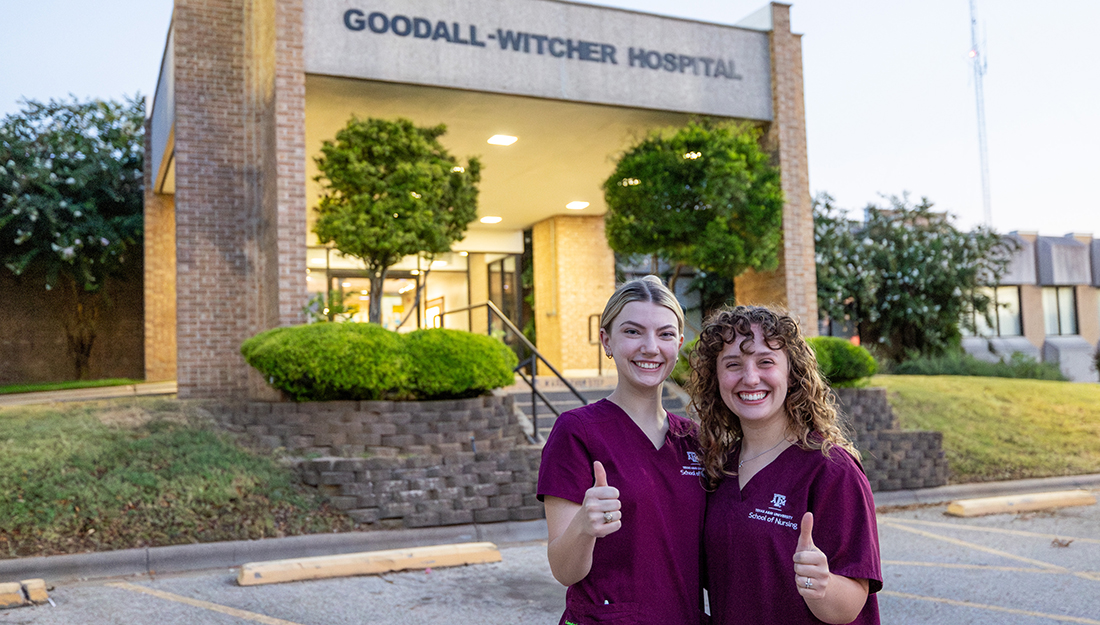
Former nursing students Jordan Palmer '24 and Emma Chrane '24 participated in a rural-immersion clinical experience in Clifton, Texas, in summer 2024. (Cameron Johnson/Texas A&M Health Marketing and Communications)
A two-week stay in the rural community of Clifton, Texas, wasn’t initially in Emma Chrane’s plans for summer 2024. But the Fort Worth native and recent Texas A&M University College of Nursing graduate jumped at the opportunity to participate in a rural-immersion clinical rotation at Goodall-Witcher Healthcare, a hub medical facility for Bosque County just northwest of Waco.
“I wanted to experience something new and different,” Chrane said. “I didn’t know what rural looked like.”
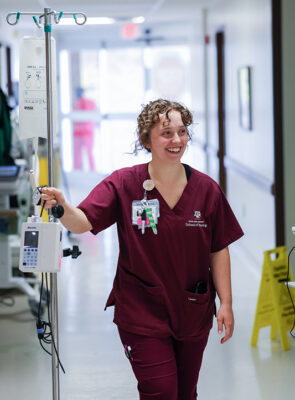
Ten nursing students like Chrane volunteered to fulfill a portion of their clinical obligations in rural areas of Texas, an experience the college piloted to prepare its graduates to take care of this underserved population.
Chrane’s time in Clifton was different than her clinical experiences in an urban area like Houston. The patients, she said, had different care needs. Chrane, who now works in the emergency department at St. Joseph Health in Bryan, worked with individuals navigating chronic conditions like high blood pressure or diabetes. Many were farmers or ranchers. Many were elderly. She left the experience with a deeper appreciation of rural nursing.
Formalizing the focus
The college has long focused on reaching rural Texans. A mobile clinic visits small towns in the Brazos Valley. Remote hospitals are connecting virtually to sexual assault nurse examiners (SANEs) at the Texas A&M Health Center of Excellence in Forensic Nursing. Nurse scientists are studying the barriers to access in health care deserts.
Over the past several years, these activities reached a fever pitch and required some coordination and development of complementary course and clinical work for students, said Leann Horsley, PhD, dean of the college.
“The pieces are all here, and we recognized an opportunity to strengthen our attention to rural health care,” Horsley said. “It is central to our mission as a land-grant institution in a state that has the country’s largest rural population.”
Thanks to funding from the 88th Texas Legislature, nursing in early 2024 joined the Texas A&M College of Medicine and Texas A&M Rural and Community Heath Institute (RCHI) to create the Texas A&M Health Rural Engagement Program. The support allowed the college to quickly re-organize its rural health efforts.
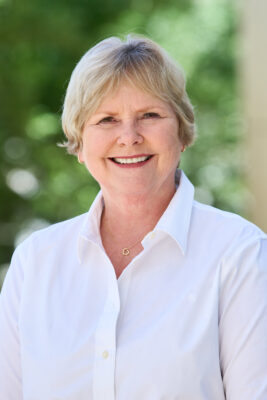
The college’s Rural Health Initiative is responsible for developing rural nurses and expanding access to care. Longtime rural nurse practitioner and nurse educator Kim Hudson-Gallogly, PhD, a clinical associate professor, directs the initiative and serves as the college’s lead in the Rural Engagement Program.
Building a blueprint
To reach rural areas, the college is engaging in scholarship support, developing new curriculum and clinical experiences, and growing its clinical practice.
“We know rural Texans need us,” Hudson-Gallogly said. “Our plan is multi-faceted and, importantly, designed to be long term and sustainable.”
To bolster the state’s workforce, nurses working in a rural area have access to $375,000 in scholarship support annually to earn their bachelor’s, master’s or doctorate degree or specialty certificate from Texas A&M.
Just as the college’s graduate students do, those studying in any of the undergraduate programs will soon have specialized coursework in rural health care and options to train in rural settings like Chrane did in Clifton.
The college also operates the Texas A&M Health Mobile Clinic and a same-day clinic at the Texas A&M Health Hub in Navasota. Both are nurse practitioner-led and provide an additional rural training ground for nursing students.
“You don’t have to explain the concept of Selfless Service to an Aggie nurse—it’s in their DNA,” Hudson-Gallogly said. “We want to support those nurses already serving rural communities by offering a pathway to upskilling at minimal cost to them. But we also want all our graduates to have a foundational knowledge of how to deliver rural health care.”
The rural experience
While Chrane’s two weeks in Clifton differed from her upbringing in urban Fort Worth, her classmate and clinical partner Jordan Palmer was more familiar with rural. She grew up in Collinsville, population 2,200, and graduated in a class of 36.
“The things we learned here you may not learn at a larger hospital,” Palmer said. “You understand how to maximize resources. You get to know these patients intimately.”
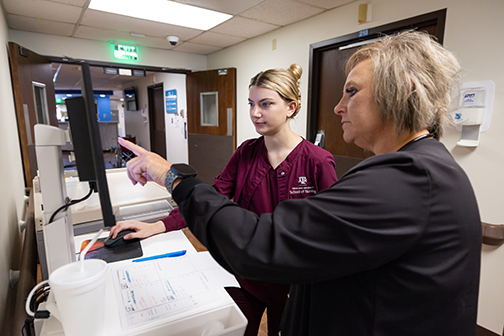
Palmer, who also did clinical work on the mobile clinic, accepted a position in the neurological intensive care unit at UT Southwestern Medical Center in Dallas after graduation. But she hasn’t ruled out returning to her rural roots later in her career.
“I would consider being a nurse practitioner in a rural setting,” she said.
That’s a contemplation straight from the rural nursing playbook, according to Hudson-Gallogly.
“We hope exposing our students to rural areas will inspire them to return and serve those patients and communities,” she said.
In addition to Chrane and Palmer’s two-week stop in Clifton, other students in the rural-immersion opportunity spent time in Pearsall and Mason. Nursing leaders expect the roster of rural health care facilities to grow each year.
‘Growing, modernizing and responding’
The college’s expansion and commitment to meeting communities and students where they are will allow it to reach deeper into Texas.
Enrollment has grown 20 percent over the past five years. In spring 2026, a new campus opens in McAllen to offer future Aggie nurses in the Rio Grande Valley a traditional Bachelor of Science in Nursing program. The college’s graduate, certificate and RN-to-BSN programs are delivered online. And clinical and outreach teams are exploring more nurse-led clinics and ways to use telehealth to provide needed primary and mental health care to communities through their local school districts.
“Rural health matters,” Horsley said. “We are growing, modernizing and responding to meet the health care challenges facing our state.”
Media contact: media@tamu.edu
